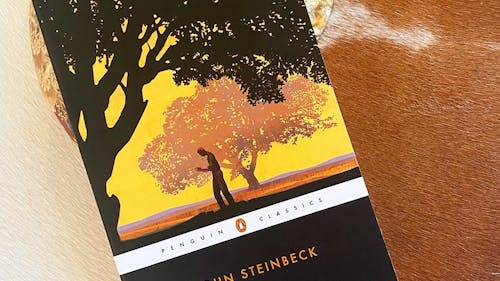MALIK: We have become too puritanical about our media
Column: On the Good Life

Recently, a friend of mine and I were browsing through a bookstore, and she picked up "East of Eden" by John Steinbeck — a great book that I was currently reading. Within 20 minutes of reading, she put the book away, stating that the author was racist.
While I did not know much about Steinbeck at the time of reading the book, I do not remember thinking anything of that sort about him. And if you look further into Steinbeck himself, he writes as a champion of the worker in novels like "The Grapes of Wrath." He discusses discrimination and racism in "Of Mice and Men," and he apologized for his portrayal of paisanos in "Tortilla Flat."
He was not perfect in any way, but upon reading "East of Eden" for 20 minutes, I would not have reached the conclusion that he is racist. I reread the beginning because of my shock upon hearing this and found that, instead, a character in the novel was racist.
It is an interesting thing that the idea of putting in a racist character, to my friend, was not a reflection of the time in which the story was told or a statement on the character itself but rather a reflection of the author’s own views.
She equated the views of those in the novel to those of the author itself unless the author painstakingly made it clear that that character was a terrible person. She wanted the author to make the morals clear in the novel by reducing realistic stories to tropes of good versus evil where good wins.
This is a larger trend I have noticed on TikTok as well, especially the subsection of videos that focuses on books, known as BookTok. Books are constantly labeled for the negativity they contain, but in a way that is seen as a reflection of the authors themselves.
It is not shocking to see a comment along the lines of: "She depicted a toxic relationship and is therefore romanticizing it" or "By making the narrator have a mental illness, she is romanticizing it."
Authors are not only blamed for their choices to depict something but also held accountable for their audience's reaction to it, whether they romanticize it or call it out. Books are not simply books anymore but statement pieces that directly show an author’s view and how they write.
When we think of novels like "Lolita" by Vladimir Nabokov or "A Clockwork Orange" by Anthony Burgess, both of which were adapted to be on the big screen, we can see how the books are used to make a statement — whether it is on pedophilia or youth violence. While the presentation is purposefully created to make one uncomfortable, it is up to the audience to notice this, as it is not said explicitly.
The current debate on this lack of media literacy has reminded me of the essay by Roland Barthes known as "The Death of the Author," in which he argues that an author’s views should not add to the interpretation of pieces itself but rather should be disregarded in understanding media.
While there is some merit to understanding an author’s work based on the author’s views, doing so does not show the whole picture. Part of being a reader is immersing yourself in a story and applying your own understanding to it.
As we have more seemingly personal access to public figures, it is easy to take part in an understanding of them where all their artistic choices, writings or choices in roles reflect their endorsement of a certain lifestyle.
This has removed them from the pedestal of artists, and they are now seen more as influencers, with which comes criticism and what may seem like an inherent endorsement of different lifestyles. We seek to understand artists through the choices they make regarding their art.
But this view is a detriment to the stories that are trying to make a statement and our own abilities as viewers or readers. By becoming too puritanical about the media we consume, we risk losing statement-oriented stories and the ability to critique and understand anything beyond our own collective morals.
Everything gets the label of good or bad without any room for nuance and understanding. No artist can create without fear of being labeled. It is time to put the artists aside and think about art critically rather than as an understanding of those who have taken part in it.
Sehar Malik is a first-year in the School of Arts and Sciences where she is majoring in molecular biology and biochemistry and minoring in French. Her column, "On the Good Life," runs alternate Thursdays.
*Columns, cartoons and letters do not necessarily reflect the views of the Targum Publishing Company or its staff.
YOUR VOICE | The Daily Targum welcomes submissions from all readers. Due to space limitations in our print newspaper, letters to the editor must not exceed 900 words. Guest columns and commentaries must be between 700 and 900 words. All authors must include their name, phone number, class year and college affiliation or department to be considered for publication. Please submit via email to oped@dailytargum.com by 4 p.m. to be considered for the following day’s publication. Columns, cartoons and letters do not necessarily reflect the views of the Targum Publishing Company or its staff



